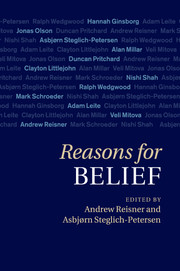Book contents
- Frontmatter
- Contents
- Contributors
- Preface
- Introduction
- PART I NORMATIVE REASONS FOR BELIEF
- 1 How to be a teleologist about epistemic reasons
- 2 Is there reason to be theoretically rational?
- 3 Epistemic motivation
- 4 Error theory and reasons for belief
- 5 Can reasons for belief be debunked?
- PART II REASONS AND EPISTEMIC JUSTIFICATION
- References
- Index
2 - Is there reason to be theoretically rational?
Published online by Cambridge University Press: 05 July 2011
- Frontmatter
- Contents
- Contributors
- Preface
- Introduction
- PART I NORMATIVE REASONS FOR BELIEF
- 1 How to be a teleologist about epistemic reasons
- 2 Is there reason to be theoretically rational?
- 3 Epistemic motivation
- 4 Error theory and reasons for belief
- 5 Can reasons for belief be debunked?
- PART II REASONS AND EPISTEMIC JUSTIFICATION
- References
- Index
Summary
INTRODUCTION
An important advance in normativity research over the last decade is an increased understanding of the distinction, and difference, between normativity and rationality. Normativity concerns or picks out a broad set of concepts that have in common that they are, put loosely, guiding. For example, consider two commonly used normative concepts: that of a normative reason and that of an ought. To have a normative reason to perform some action is for there to be something that counts in favor of performing that action, perhaps that doing so will result in a good outcome. Likewise with ought, when there is sufficient evidence for something, one ought to believe it (at least under normal circumstances). Not all guidance need be directed toward a specific mental state or a specific action. Subject to the requirements of normativity, too, are relations. It is commonly believed, for example, that we ought not to hold contradictory beliefs.
At least some of the requirements that concern relations amongst an agent's mental states are, or seem, distinctive. Agents who fail to satisfy these requirements are considered irrational to some degree. On many current views, being irrational is distinct in some way from not being how one ought to be; rationality is a concept commonly thought distinct from normativity by philosophers working on reasons and oughts. Much of the literature on this topic over the last decade stems from attempts to capture the characteristic features of the requirements of rationality.
Keywords
Information
- Type
- Chapter
- Information
- Reasons for Belief , pp. 34 - 53Publisher: Cambridge University PressPrint publication year: 2011
Accessibility standard: Unknown
Why this information is here
This section outlines the accessibility features of this content - including support for screen readers, full keyboard navigation and high-contrast display options. This may not be relevant for you.Accessibility Information
- 10
- Cited by
